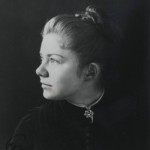Rochester Philharmonic Orchestra in area premiere of rare, remarkable Concerto. [update added at end after hearing second performance]
Amy Beach was 33 years old when she gave the premiere performance of her own Piano Concerto (op. 45 in C-Sharp Minor) in April 1900. Although her husband had restricted the pianist-composer to one public performance per year since their marriage in 1885, she had experience under her belt performing concertos by Beethoven, Mozart, Mendelssohn, Saint-Saëns, Moscheles, and Chopin, mostly with the Boston Symphony. Her Concerto is a work of monumental proportions, demanding the utmost of virtuosity from a fiery soloist. Would the 23-year old Saet Byeol Kim emerge not only unscathed but heroic in this vigorous battle of soloist vs. orchestra? 
She did indeed, and after the final majestic chords, the audience was on their feet in an ovation to affirm that fact.
The orchestra begins the first movement with a brooding motive (shaped insightfully by Remmereit). The soloist’s first entrance is a huge assertion—here is the 19th century concerto tradition, in all its stormy, extrovert glory. And counterbalanced by lyricism, as the second theme—an evocative, haunting phrase, stated first by the soloist, and developed warmly by a violin solo (Concertmaster Juliana Athayde). For this theme Beach borrowed a melody from one of her own earlier songs (I’ve provided the poems for these songs in an earlier post).
Beach described the Largo as a “dark, tragic lament.” She borrowed from her own early song “Twilight,” setting her husband’s poem about darkness setting over a dense forest scene. Beach’s re-use of her creation offered her an opportunity to place these musical ideas in a rich, multi-layered context (sculpted gorgeously by the orchestra). The melody was introduced by a poignant clarinet solo (Kenneth Grant). Here I thought Kim might have had more depth of emotion and meshed more tautly with the orchestra; her Chopinesque flourishes were brilliant emotional outbursts.
Mussorgsky’s atmospheric Introduction to Kovanschchina was a perfect concert opener, and Tchaikovsky’s Sixth Symphony —well, we know that piece, don’t we? It was a thoughtful and well-balanced program. For me, the chance to hear a remarkable work like Beach’s concerto was well worth the travel.
For her U.S. debut, pianist Saet Byeol Kim has made a definite mark on the artistic landscape, and I hope she will have many other opportunities to bring this work to audiences. And Arild Remmereit and the RPO continue in their remarkable, essential mission of bringing such great—but little-known—masterworks to the ears of audiences!
* * * * * * * * *
Update — after hearing the Saturday (Nov. 17) concert — Saet Byeol Kim again impressed with the energy and freshness she brought to the piece, it was not at all a carbon-copy of the Thursday performance. She reached real lyrical heights in the third movement, Largo. The first movement, with its imposing length, had moments of solo and orchestra careening into imprecision, but these were (fortunately) very brief. The overall effect was powerful and exhilarating, and the Saturday audience could not contain their applause after the first movement. And at the conclusion Kim, Remmereit, and the orchestra received a lengthy and insistent standing ovation!
Oh, and that Tchaikovsky—the Sixth needs both understanding of the underlying architecture, as well as fiery passion; Remmereit and the orchestra had an inspired chemistry throughout. Particularly striking was dance-like grace of the second movement, with its almost-waltz of 5-4 time. And the overwhelming power of the fade-to-nothing ending, which I heard, not as tragic resignation, but rather as a determined resolve. I certainly have not ever experienced a large audience all holding their breath for so long, so complete was the spell of the peroration, one I will not forget.
